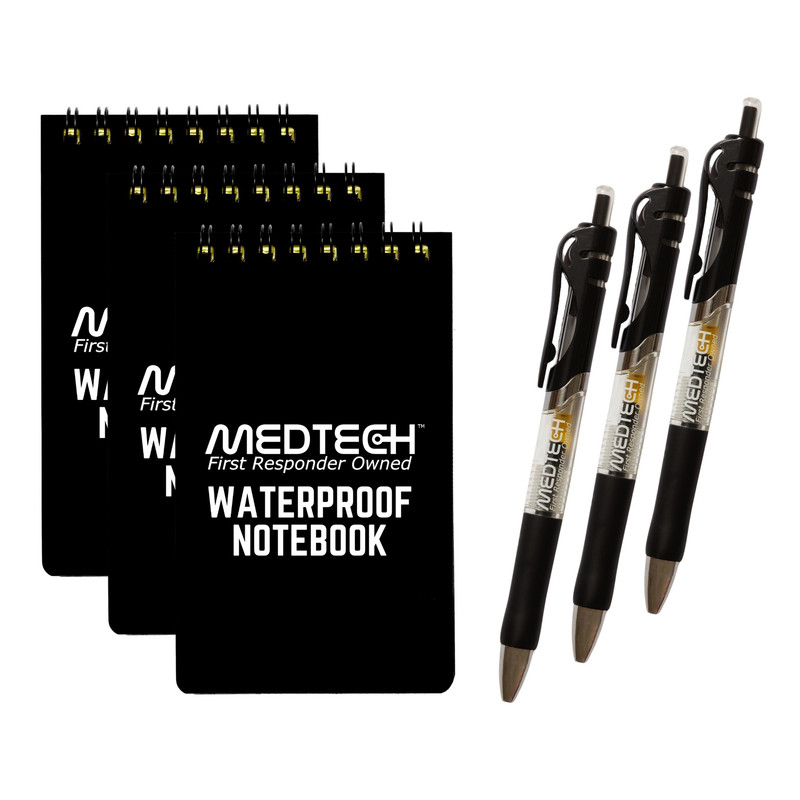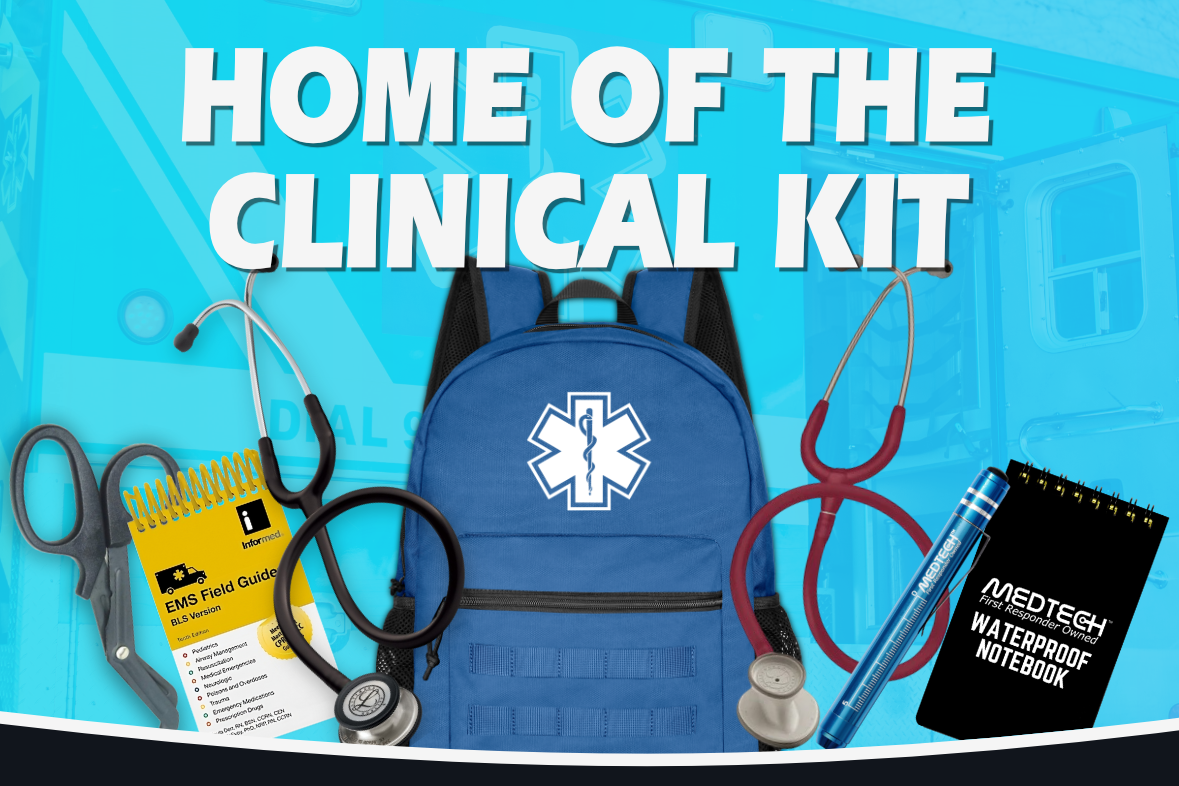A notepad and pen set becomes a steady companion for EMS students as they move through training. It gives them a place to capture quick thoughts, vital signs, and reminders that support each skill they practice. A compact pad that stays readable in different conditions brings confidence during both classroom work and early clinical shifts.
Students rely on simple tools that help them stay organized while learning. A dependable notepad from MedTechKits makes it easier to follow assessments, track progress, and review patterns later. When pages remain clear even in busy environments it supports a smoother learning rhythm.
This set reflects the kind of practical gear students can trust from the start of their education. Each piece is designed to handle daily use and support the routines that shape their development. MedTechKits builds it with the needs of students in mind which makes it a useful addition to any training setup.
Documentation You Can Actually Trust
In EMS training, few things feel as unsettling as opening your notepad after a busy lab or ride-along and discovering that half your vitals have blurred into gray streaks. A spilled saline bottle, a gloved hand still damp from a procedure, or a sudden rain while you’re charting on the ambulance bumper, any one of them can turn careful documentation into guesswork.
When you’re a student, your notes aren’t just practice. They’re the evidence your clinical preceptor reviews, the record you’ll reference when you’re quizzed on a scenario, and the foundation for the professional habit you’ll carry for the next twenty years. A single illegible line can shake your confidence more than any skills station ever could.
The MedTechKits Waterproof Notepad removes that quiet worry. Every page is treated to shrug off moisture. Whether it’s a splash, a drizzle, or the condensation that builds up inside a packed trauma bag. You write once, clearly, with the zebra pen, and what you put down stays exactly as you wrote it. No smudges, no bleeding ink, no second-guessing later.
For students, that reliability translates into something bigger: the calm assurance that your documentation will hold up when it’s reviewed, questioned, or simply needed again at 2 a.m. while you’re studying for tomorrow’s exam. It’s one less variable to manage while everything else is new.
The Waterproof Notepad

The waterproof notepad from MedTechKits is small enough to fit into a pocket or side pouch which makes it easy to reach during labs or clinical rotations. Students can write through light moisture or splashes without losing clarity on the page. The size makes it practical for recording vital signs, short assessments, and quick reminders during clinical transitions.
Its 48 sheets give enough space for daily notes without feeling bulky. The college ruled layout helps students keep clean lines that remain readable as they review their notes after class. Many students prefer a compact pad because it creates a simple habit. They reach for it often which strengthens consistency in documentation.
The waterproof coating on each page keeps writing sharp even when students are practicing around fluids or moving between different environments. This makes the notepad useful for outdoor scenarios, ambulance ride-alongs, and busy lab stations where spills are common. The durable cover protects the pages from bending in pockets which helps the pad hold its shape through daily use.
The compact three by five inch size keeps the notepad light enough to carry without adding bulk to a uniform or kit. Its simple binding allows pages to turn smoothly which helps students record information quickly during assessments. The overall design focuses on practicality which makes the notepad a straightforward and dependable tool for regular training.
Building Reflexes That Last a Career
The best medics aren’t born with perfect charts, they build them one shift at a time, starting in school. Every time you reach for this little 3 × 5 notepad during a skills lab, you’re quietly training your hand and your brain.
Jot the blood pressure the moment you release your cuff, note the lung sounds while they’re still ringing in your stethoscope, sketch the mechanism of injury before the details fade. When your own trauma shears are already on your belt, your pen is clipped to your pocket, and your notepad shrugs off sweat or spilled saline, everything flows.
You’re never stuck borrowing a classmate’s half-dead pen, digging through a shared bin for a working stethoscope, or flipping through someone else’s soggy spiral. Having your own EMS kit, means every repetition is done the same way, with the same reliable tools. That consistency is what turns separate skills into one smooth, automatic sequence.
Years from now, when you’re the preceptor watching a nervous student fumble for a pen, you’ll realize the habit started here: with a waterproof page that rewarded consistency instead of punishing it. The notepad may only last a semester or two, but the reflex you build with it, the instinct to document cleanly and accurately, stays for an entire career.
That’s why so many instructors tell their classes the same thing: get the right tools early, use them every single day, and the paperwork will never slow you down when a real patient needs you to be fast.
Equipment Made to Strengthen Student Learning: MedTechKits
Quality training tools shape the way students learn, and that idea has guided the work of medkit. The company focuses on creating gear that supports students from their first day in class to their final clinical rotation. Each product is designed to help learners stay organized and confident as they build essential skills.
Every item in their catalog reflects careful attention to what students actually use during labs, simulations, and early patient interactions. The goal is to offer tools that feel practical, familiar, and reliable in any setting. This approach has made their gear a dependable choice for those beginning their EMS education.
Students often mention how much easier their training becomes when they have equipment that fits smoothly into their routine. Pens that write cleanly, notepads that stay readable, and accessories that hold up through daily use all play a small but important role. These details are what shape the thoughtful design behind every product from MedTechKits.
The Little Upgrade That Matters
It won’t flash lights or beep alarms. It doesn’t come with a certificate or a patch for your uniform. But every time you pull this 3 × 5 waterproof notepad from your pocket and write a clean set of vitals, you’ll feel the difference.
You’ll hand your preceptor notes that actually look professional. You’ll review lung sounds you wrote down five hours ago and still read them perfectly. You’ll finish clinicals with a full record of what you saw, what you did, and how far you’ve come.
That’s what this small set does: it turns ordinary student moments into quiet, repeatable wins. Thousands of EMT and paramedic students have already made it their everyday carry. Most order a new one each semester because once they’ve used it, they won’t go back. For less than a couple of coffees, give yourself the one upgrade that keeps working long after the semester ends.
Frequently Asked Questions
Q1. How many sheets are in the notepad?
Each notepad contains 48 college-ruled sheets. This gives students plenty of space to write down notes, record vitals, and track observations. The layout helps keep information organized and easy to review later.
Q2. Can this notepad fit in standard EMS uniform pockets?
Yes, the notepad is compact at 3 × 5 inches. Its size makes it convenient to carry in pockets, pouches, or small kit compartments. Students can easily reach it during labs, clinicals, or field practice without added bulk.
Q3. Is the cover hard or soft?
The notepad has a flexible vinyl cover on both the front and back. It is tough enough to protect the pages but bends slightly without creasing. This balance keeps the notepad durable while remaining easy to carry.
Q4. Is the notepad durable for daily EMS student use?
Yes, the cover and binding are designed for repeated use. Pages resist bending or tearing even when handled frequently. This makes it a reliable tool for everyday labs, simulations, and clinical shifts.





Comments